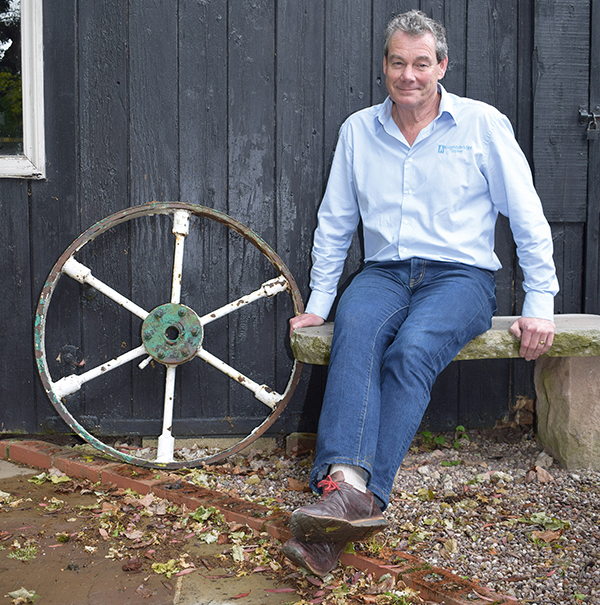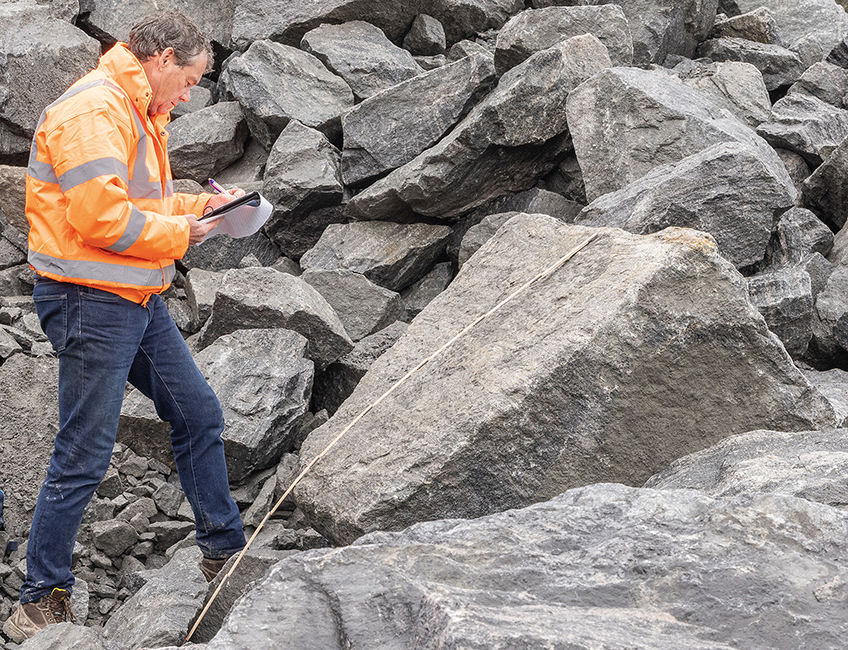CONSULTANTS: Knightsbridge Stone is a chip off the old Blockstone
Iain Kennedy, a former President of Stone Federation Great Britain, has left Blockstone to set himself up as a stone consultant under the company name of Knightsbridge Stone. He talks about the move.
After 36 years working full-time in the stone industry, Iain Kennedy has left Blockstone, the British stone supplier that became part of the group of businesses centred around specialist contractor Grants of Shoreditch, to set himself up as a consultant under the name of Knightsbridge Stone.
“I had reached the point where I thought the work-life balance needed a little bit of addressing,” says Iain, adding: “I’ve been very fortunate in my time in the stone industry, it’s time to put a little bit back to help other people.”
The Knightsbridge Stone name is a nod to Iain’s grandfather, Jimmy Kennedy, who had a company called Knightsbridge Music. Jimmy wrote Hang out Your Washing on the Siegfried Line when he was a captain in the British Expeditionary Force during the early stages of the Second World War. He went on to write the lyrics to Red Sails in the Sunset (there is still a Red Sails Festival in Portstewart in Northern Ireland where Jimmy lived), The Hokey Cokey, Teddy Bears Picnic and My Prayer, which was in the American Top 10 five times.
There has been no shortage of people seeking the benefit of Iain Kennedy’s experience since he decided he wanted to spend less time on the road and a bit more with his grandchildren, but he says he is being selective about the work he takes on. He wants to be involved in projects that interest him and can benefit most from his experience.
“The difference between me and a lot of consultants is that many came up through the design side of the business. My experience is more practical – getting stone on to a wagon and on to site, whether that’s in the UK or abroad.
“Usually what I do is under the radar, carrying out research, visiting quarries, selecting block.
“Most companies don’t have an excess of people. There are times when you need someone you trust and know has the experience to lend a hand. I can do project management from quarrying to delivery of the stone on site.”
One of the people he has been working with is his own son, Jason, who formed a natural stone rainscreen cladding company called Stone Cladding Systems in 2016.
Iain’s career in the stone industry saw him become Managing Director first of Farrar’s and then Realstone before moving with Blockstone when it became part of the Grants Group. But it all started at Camborne School of Mines in Cornwall, with its world-class combined geoscience and mining department. “I wanted a job that didn’t involve sitting behind a desk, and studying mineral processing and mining engineering was a good starting point,” says Iain
After graduating, he went first to west Africa for diamond mining and then east Africa to work in the gold mining industry. He then joined a concrete company before moving into the natural stone industry with Waterhouse Denbigh (part of Ennstone) in Bradford. Waterhouse Denbigh had interests in aggregates and dimensional stone.
“I didn’t know much about stone per se at that point – I was employed to manage the business. But I joined the Stone Federation Technical Committee, which was run by John Long at the time, and that’s where I really started learning about stone and how to use it.”
Eventually the Waterhouse Denbigh quarry was exhausted and the land was sold for housing. Iain moved to George Farrar (Quarries), first as Sales Director, then Managing Director. From there he moved to Realstone and Blockstone, first as Marketing Director and later Managing Director.
“During the journey I was fortunate enough to be elected President of Stone Federation Great Britain for two years from 2012 to ’14.”
Blockstone extracts block from 13 quarries in the UK, but most of the stone used in the UK is imported, and Realstone used whatever stone was specified for any project it was working on, although that included stone from the group’s own quarries where appropriate.
Iain: “Because stone is an international commodity, pre-Brexit and pre-pandemic I travelled abroad a lot, including going to China and India. When I first went there they hadn’t see many foreigners.”
Iain says the stone industry has been kind to him and “I have met some wonderful people in it”. But, he says, it is dominated by SMEs [small & medium sized enterprises], “with more Ss than Ms”.
“That means you’re dealing generally with the principal of a company, or very close to it, rather than some faceless organisation. It makes life more difficult initially, but eventually, as you get to know people, it makes life easier. The people you are dealing with are in a position to make decisions without referring to anybody else. They’re clever people and you can learn a lot from them. But it means the industry as a whole doesn’t have the collective fire power to market its products that other building supply sectors have.
“Brick, concrete, steel: they have a lot of cash behind them to present their credentials, which the stone industry doesn’t. Small companies tend to be concerned with the immediate requirements of their businesses and don’t necessarily look to the longer term.”
The stone industry in the UK has grown phenomenally during the 36 years Iain has been involved with it. He has seen the machinery used move on from manual Anderson Grice saws and jenny linds to six axes CNCs. He remembers the first faxes before the internet introduced email. People sent letters in the post. “Everything was slower, which gave you time.”
It was the new millennium that convinced a lot of people they needed to enter the computer age, just as Covid has convinced them to make more use of it for communications, including video conferencing and marketing with social media.
Iain does not dislike CNC machinery and computer technology. He says: “It’s a pleasure seeing a CNC making a scroll or hood in two-or-three days that would have taken masons two-or-three weeks 30 years ago.”
But it increases time pressure and companies have become time poor. “Main contractors don’t seem to understand – or we haven’t got it across to them – that stone is a bespoke item, made to order. You have to leave time for design, selection and production.
“With emails, everyone expects a response immediately. If they don’t get one, you get a telephone call. Companies employ fewer people – and lately haven’t been able to find the people they do need... although finding the right people in the stone industry has always been difficult. It isn’t a sexy industry; it’s not a highly visible part of construction.
“Because time pressure is much greater now, I think someone like myself can usually find work. There’s always someone who needs help because there isn’t any excess labour.”
The speeding up of stone processing has meant the price of stone products has come down – even though it might not seem like it just at the moment due to the price increases resulting from high levels of demand worldwide, rising commodity prices, disruption of supplies due to the pandemic, huge increases in the costs of shipping, containers and transport, and now rising fuel prices as a result of the war in Ukraine.
But when it comes to something like sandstone walling from British quarries, Iain says it was £30-35 a square yard when he first came into the industry and it is not much different now. And he thinks it is too cheap. “You’re getting an awful lot more from stone than you get from some other building products and that’s not necessarily reflected in the price.”
Iain says he is optimistic for the future of the stone industry, but he would like to see more collaboration to market stone as a low carbon, sustainable product. “It’s a very simple message, it’s getting it out there that’s difficult.”
He says there will always be man-made products competing with natural stone and they all want to compare themselves to natural stone, so “we have to spread the message of the obvious benefits of natural stone that we all know about. People don’t hear that message often enough and in the right way. It’s one thing visiting someone and telling them but another having a marketing set up to continually reinforce that message.”
He hopes that by working with companies to supply stone to major projects he will have the opportunity to help get that message out to clients and professionals in the broader construction market.


